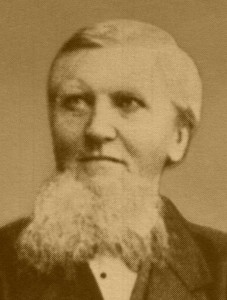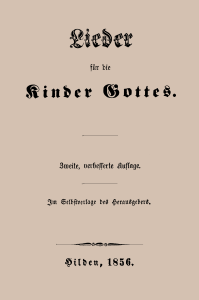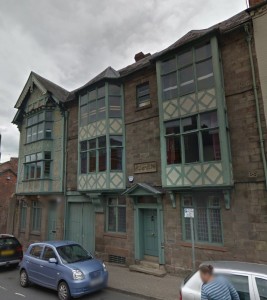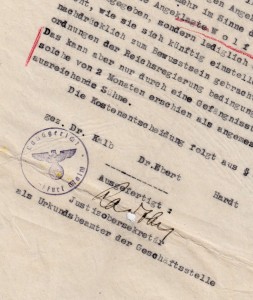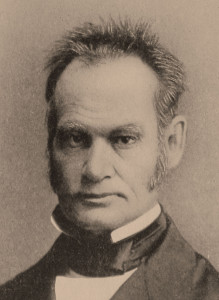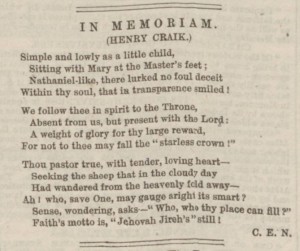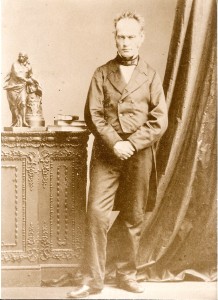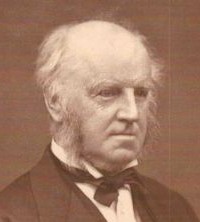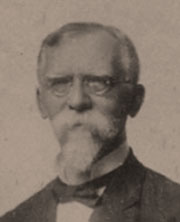
Wer hat den Tisch des Herrn? Diese Frage hat die „Brüder“ schon immer beschäftigt. Eine eher ungewöhnliche Antwort (zumindest für einen Geschlossenen Bruder) gab darauf der amerikanische „Grant-Bruder“ Paul Jacob Loizeaux – so ungewöhnlich, dass sich Rudolf Brockhaus 1925 veranlasst sah, im Botschafter des Heils in Christo eine Richtigstellung zu veröffentlichen.
Wer war Paul Jacob1 Loizeaux? Geboren wurde er im Oktober2 1841 als ältester Sohn des Seidenhändlers Jean Jacques Loizeaux (1816–1885) und seiner Frau Marie Susanne geb. Dusse (1819–1892) im nordfranzösischen Ort Lemé. 1850 zog die Familie, die seit Generationen protestantisch war, in den Süden Frankreichs, da es dort bessere protestantische Schulen gab. Als 1853 das Seidengewerbe in eine Krise geriet, emigrierten sie in die USA; nach kurzem Aufenthalt in Illinois ließen sie sich in Vinton (Iowa) nieder und begannen erfolgreich Landwirtschaft zu betreiben.
Paul Jacob besuchte von 1860 bis 1862 das Charlier Institute, eine höhere Schule in New York, und begann anschließend eine juristische Ausbildung in einer Anwaltskanzlei seiner Heimatregion. Aufgrund von Gewissensbedenken brach er diese jedoch bald wieder ab und kehrte als Lehrer ans Charlier Institute zurück. Er bemühte sich, ein moralisch einwandfreies Leben zu führen, und erhielt von seiner Kirche sogar eine Lizenz zum Predigen, war bis dahin aber noch nicht zum Evangelium der Gnade durchgedrungen; dies geschah erst, als er während eines Krankenbesuchs auf Römer 3 und die Rechtfertigung allein aus Glauben hingewiesen wurde. Loizeaux beschloss, seinen Beruf aufzugeben und sich fortan nur noch der Verkündigung dieser Botschaft zu widmen.
In New York hatte er Celia Sanderson (1842–1908) kennengelernt, die dort ebenfalls zur Schule ging und bereits den „Brüdern“ angehörte. Am 4. Februar 1868 heirateten die beiden in Celias Heimatstadt Milwaukee (Wisconsin) und zogen anschließend wieder nach Vinton. Durch Loizeaux’ Zeugnis fand ein großer Teil seiner Familie, darunter seine Eltern und sein zwei Jahre jüngerer Bruder Timothée Ophir Loizeaux (1843–1927), zur Gewissheit des Heils. In Vinton und Umgebung entstanden mehrere Hausgemeinden.
Im Sommer 1870 besuchte Loizeaux die große Konferenz der „Brüder“ in Guelph (Ontario), zu der auch John Nelson Darby (1800–1882) angereist war. Das dort Gehörte beeindruckte ihn sehr, und so schloss er sich – ebenso wie mehrere andere Mitglieder seiner Familie – den „Brüdern“ an. 1876 gründete er gemeinsam mit seinem Bruder Timothée in Vinton den Schriftenverlag Bible Truth Depot, der 1879 nach New York verlegt wurde und sich dort unter dem Namen Loizeaux Brothers bald zu einem der wichtigsten amerikanischen Verlage der „Brüder“ entwickelte.
Ab 1881 wohnten die Brüder Loizeaux in dem ca. 40 km westlich von New York gelegenen Plainfield (New Jersey), wo sich auch Frederick William Grant (1843–1902) niederließ. Paul Loizeaux predigte viel in den umliegenden Versammlungen, verkündigte das Evangelium und schrieb etliche Broschüren und Zeitschriftenartikel.3 Die höchste Auflage (mehrere Millionen!) erreichte eine bereits 1871 erschienene Schrift über den zum Tode verurteilten Verbrecher Daniel Mann, der im Gefängnis von Kingston (Ontario) durch Loizeaux zum Glauben gekommen war.4 Über seine Evangelisationsweise berichtet Henry Allan Ironsides Biograf eine interessante Episode:5
Mr. Loizeaux war vor allen Dingen ein Evangelist, der durch sein kraftvolle Verkündigung viele Menschen ansprach.
Eines Abends begab sich Ironside früh zum Versammlungssaal. Er stand hinten in einer kleinen Nische, die durch eine Querwand vom Rest des Saales abgetrennt war. Da kamen zwei Männer herein und betraten gleich den Hauptraum. Einer der beiden sagte: „Ist dir aufgefallen, worin sich der Predigtstil Loizeaux’ von dem Ironsides unterscheidet?“
Harry hielt es für angebracht, seine unsichtbare Anwesenheit kundzutun, aber bevor er überlegen konnte, was er sagen solle, antwortete der zweite Mann dem Fragenden: „Die beiden kann man überhaupt nicht miteinander vergleichen. Sie sind so grundverschieden.“
Jetzt war es zu spät, und im nächsten Augenblick hörte der unfreiwillige Lauscher den ersten Mann sagen: „Ja, aber es gibt eine Sache, die ins Auge fällt. Wenn Paul Loizeaux spricht, sagt er den Leuten immer, was sie bekommen werden, wenn sie zu Christus kommen. Harry Ironside dagegen sagt ihnen immer, was sie erwartet, wenn sie es nicht tun.“
Ironside wurde von diesem Gegensatz so getroffen, daß er das Gespräch später am Abend Mr. Loizeaux mitteilte. Jener sagte auf die für ihn typische Art: „Ja, mein lieber junger Bruder, das sollte uns zu denken geben. Wir dürfen niemals vergessen, daß unser großer Auftrag darin besteht, die Gnade Gottes zu verkünden.“
Als es 1884 zur „Grant-Trennung“ kam, blieben die Brüder Loizeaux treu auf der Seite Grants. Bei den späteren Vereinigungsgesprächen mit anderen „Brüder“-Gruppen spielte Paul Loizeaux meist eine führende Rolle, so bereits 1886, als William Kelly (1821–1906) nach Amerika kam, um die Aussichten für einen Zusammenschluss zwischen „Kelly-“ und „Grant-Brüdern“ zu erkunden (was letztlich an der Verbindung der „Grant-“ mit den „Stuart-Brüdern“ scheiterte, die Kelly nicht akzeptieren konnte). Der 1892 getroffenen Entscheidung der „Grant-Brüder“, auch Offene Brüder zum Brotbrechen zuzulassen, stand Loizeaux skeptisch gegenüber, trug sie aber doch mit – bevor sie 1893 und 1894 schrittweise wieder rückgängig gemacht wurde. 1909 reiste Loizeaux mit drei anderen führenden „Grant-Brüdern“ nach England, um einen möglichen Zusammenschluss mit den „Glanton-Brüdern“ zu erörtern, doch konnte darüber ebenfalls keine Einigung erzielt werden – Loizeaux nahm es den „Glanton-Brüdern“ übel, dass sie sich nicht eindeutig vom Ausschluss Clarence Esme Stuarts (1885) distanzieren wollten, und sprach sich schließlich gegen ein Zusammengehen mit ihnen aus. Den Aufenthalt in Europa nutzte er danach noch zu einem Besuch seiner französischen Heimat.
Wann Loizeaux seine kleine Broschüre über den Tisch des Herrn schrieb, ist unbekannt – sie erschien unter dem Titel The Lord’s Table: Who Has It? ohne Jahresangabe im Verlag Loizeaux Brothers. Den Hintergrund bildeten vermutlich die Gespräche mit anderen „Brüder“-Gruppen, die den Tisch des Herrn für sich allein beanspruchten. Das Fazit von Loizeaux’ Überlegungen lautete:
Es gibt auch nur einen Tisch des Herrn; der andere ist „der Tisch der Dämonen“ (1. Kor. 10, 21), und der Tisch des Herrn ist da, wo der „eine Leib“ des Herrn ist. Er gab ihn der „Versammlung, welche sein Leib ist“, und eine jede Teilkirche, die dessen ausschließlichen Besitz für sich in Anspruch nehmen würde, wäre damit ebenso stolz und überheblich, als wenn sie behaupten würde, ausschließlich der Leib des Herrn zu sein. […] Die wahre Kirche, der wahre Tisch des Herrn, die Gegenwart des Herrn in der Mitte der Seinen sind Dinge, die niemals Besitz einer Sekte sein können. Nie kann irgendein bestimmter Teil des Volkes Gottes diese Dinge in ausschließlicher Weise vorwurfslos für sich in Anspruch nehmen. Nur Hochmut kann dazu führen, und „Gott widersteht dem Hochmütigen“!6
Auch wenn in einer Gemeinde Missstände vorhanden seien, die eine Trennung erforderlich machten, bedeute das nicht, dass dort nicht mehr der Tisch des Herrn sei:
Wenn also eine Gemeinschaft von Gläubigen an Grundsätzen festhält, die durch das Wort Gottes verurteilt werden, oder wenn sie ungerecht handelt und sich weigert, Buße zu tun oder von der Ungerechtigkeit abzustehen, so können wir dennoch nicht behaupten, daß sie nicht mehr des Herrn Gegenwart in ihrer Mitte genießen oder den Tisch des Herrn haben. Diese Frage zu beantworten ist nicht unsere Angelegenheit. Wir haben nur einfach Gott in allen Dingen, die Sein Wort uns anbefiehlt, zu gehorchen.7
Als diese Äußerungen – und ähnliche von Samuel Ridout (1855–1930), einem anderen führenden „Grant-Bruder“ – Rudolf Brockhaus zu Gesicht kamen, reagierte er beunruhigt:
Hört und liest man doch heute oft Worte, die man bisher in der Mitte und in den Schriften der Brüder nicht zu hören oder zu lesen gewöhnt war. Es werden Ansichten geäußert, die befürchten lassen, daß man Grundsätze, die früher für göttlich gehalten wurden, bereits aufgegeben hat, oder daß man doch in Gefahr steht, sie aufzugeben.8
Als Beispiele zitiert Brockhaus zunächst zwei Sätze von Ridout:
So lehrt man z.B. in Verbindung mit der uns beschäftigenden Frage: „Der Tisch des Herrn wurde einst für Seine ganze Kirche gegeben und kann von diesem Gesichtspunkt aus von keiner Vereinigung von Gläubigen für sich, unter Ausschluß anderer, in Anspruch genommen werden“. Oder: „Der Besitz des Tisches des Herrn steht mit der Stellung des Christen in Verbindung und nicht mit seiner Treue im Wandel“.9
Dann folgt die bereits oben zititerte Äußerung von Loizeaux:
Ja, man hat sogar geschrieben: „Wenn eine Vereinigung von Christen Grundsätze festhält, die das Wort Gottes verurteilt, oder ein Unrecht begeht und sich nun weigert, im Gehorsam gegen Gott Buße zu tun, oder von der Ungerechtigkeit abzustehen, so maßen wir uns nicht an zu sagen, daß sie nicht länger des Herrn Gegenwart oder des Herrn Tisch in ihrer Mitte habe“. Das sind, wie gesagt, Worte, die mit dem, was wir bisher gehört und gelernt haben, in unmittelbarem Widerspruch stehen. Es ist aber immer eine ernste Sache, die alten Grenzen, die die Väter gesetzt haben, zu verrücken. Gottes Wort warnt uns davor in Sprüche 22, 28.10
Brockhaus hatte Ridout seine Bedenken zunächst brieflich mitgeteilt (12. Mai 1925, mitunterzeichnet von Johannes Nicolaas Voorhoeve) und verarbeitete sie anschließend zu dem bekannten Botschafter-Artikel „Der Tisch des Herrn“, der auch als separate Broschüre11 erschien:
Sie [die nachstehenden Gedanken] wurden anläßlich eines Briefwechsels über eine Zuchtfrage, deren Entscheidung eine schmerzliche und weitgehende Trennung nach sich gezogen hat,12 niedergeschrieben, um beide Seiten noch einmal an die einfachen Grundlinien des Wortes Gottes zu erinnern, sowohl hinsichtlich der Feier des Abendmahls und des Zusammenkommens im Namen Jesu „außerhalb des Lagers“, als auch einiger mit dem Tische des Herrn in Verbindung stehender Wahrheiten.13
Mit Loizeaux konnte sich Brockhaus nicht mehr persönlich auseinandersetzen, da er zu dieser Zeit schon nicht mehr unter den Lebenden weilte. Er starb am 3. Oktober 1916, heute vor genau 100 Jahren, an seinem Wohnort Plainfield und wurde auf dem Hillside Cemetery in Scotch Plains begraben.
Ironside fasst seinen Dienst wie folgt zusammen:
cultured and of magnetic personality, he became a spirit-filled and flaming evangelist and went everywhere proclaiming the Word, in self-denying dependence on the Lord.14
Später nennt er ihn noch
the able evangelist whose fiery eloquence had made him the outstanding preacher in this particular section of the movement.15
Online zugängliche Biografien Loizeaux’ sind mir keine bekannt. Die obigen Informationen entstammen im Wesentlichen den Büchern von Noel,16 Ironside17 und Ouweneel,18 überprüft und ggf. korrigiert durch die Broschüre A Good Soldier of Jesus Christ. A Short Memoir of Paul J. Loizeaux von Samuel Ridout (New York [Loizeaux Brothers] o.J.).
